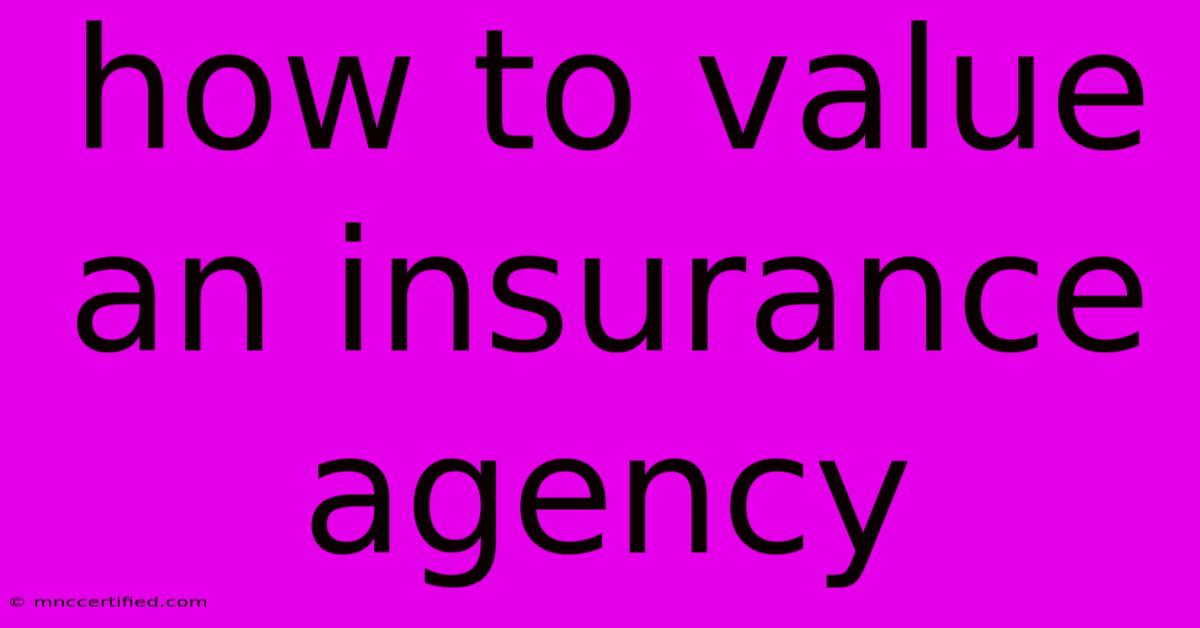How To Value An Insurance Agency

Table of Contents
How to Value an Insurance Agency: A Comprehensive Guide
Selling or buying an insurance agency is a significant financial decision. Understanding how to accurately value an insurance agency is crucial for a successful transaction. This comprehensive guide explores various valuation methods, key factors influencing value, and essential considerations for both buyers and sellers.
Understanding the Unique Aspects of Insurance Agency Valuation
Unlike other businesses, insurance agencies possess unique characteristics impacting their valuation. These include:
- Renewal Rate: This is arguably the most important factor. A high renewal rate indicates a stable client base and predictable future income. Agencies with high renewal rates command higher valuations.
- Client Concentration: Over-reliance on a few large clients introduces risk. A diversified client base is more valuable.
- Agency Size and Geographic Location: Larger agencies in desirable locations tend to fetch higher prices.
- Profitability and Revenue Growth: Consistent profitability and growth are key indicators of a healthy agency.
- Employee Expertise and Retention: A skilled and loyal team significantly enhances the agency's value. Think of it as intellectual property in action.
- Technology and Infrastructure: Modern technology and efficient processes improve operational efficiency and client service, boosting valuation.
Common Valuation Methods for Insurance Agencies
Several methods are used to determine an insurance agency's fair market value. Each has its strengths and weaknesses:
1. Discounted Cash Flow (DCF) Analysis
This method projects future cash flows and discounts them back to their present value using a discount rate reflecting the risk involved. It's a robust method, but it requires detailed financial projections and an accurate determination of the discount rate. This is often best handled with the assistance of a financial professional.
2. Market Approach
This method compares the agency's value to similar agencies that have recently been sold. It's relatively simple, but finding truly comparable agencies can be challenging, and publicly available data is often limited.
3. Asset-Based Approach
This method focuses on the net asset value of the agency, including tangible assets (e.g., office equipment) and intangible assets (e.g., client lists). It's less common for insurance agencies as the primary value lies in the renewal book of business, not physical assets.
4. Earnings Multiple Approach
This is a widely used method. It involves multiplying the agency's earnings (often EBITDA - Earnings Before Interest, Taxes, Depreciation, and Amortization) by a multiple based on industry benchmarks and comparable transactions. This requires careful selection of the appropriate multiple, taking into account all the factors mentioned earlier.
Key Factors Influencing Valuation
Beyond the valuation methods, numerous factors significantly influence an insurance agency's value:
- Type of Insurance Sold: Specialization in high-demand areas can increase value.
- Carrier Relationships: Strong relationships with major insurance carriers improve the agency's competitiveness and attractiveness.
- Sales and Marketing Strategies: A well-defined sales and marketing plan contributes to sustainable growth.
- Regulatory Compliance: Adherence to all regulatory requirements is paramount and impacts the valuation positively. A history of non-compliance will greatly reduce value.
Negotiating the Sale or Purchase
Once a valuation is established, negotiation is crucial. Both buyers and sellers should:
- Seek Professional Advice: Consult with experienced insurance brokers, accountants, and legal counsel.
- Due Diligence: Thorough due diligence is essential to identify any hidden liabilities or risks.
- Clearly Defined Terms: The purchase agreement should clearly outline all terms and conditions, including payment methods, earn-outs, and non-compete clauses.
Conclusion: A Holistic Approach to Valuation
Valuing an insurance agency is a complex process requiring a comprehensive approach. By understanding the various valuation methods, key influencing factors, and negotiating strategies, both buyers and sellers can navigate the transaction successfully and achieve a fair and equitable outcome. Remember, seeking professional advice throughout the process is strongly recommended. It's an investment that can save you significant time, money, and potential headaches down the line.

Thank you for visiting our website wich cover about How To Value An Insurance Agency. We hope the information provided has been useful to you. Feel free to contact us if you have any questions or need further assistance. See you next time and dont miss to bookmark.
Featured Posts
-
Nvidias Blackwell Ai Chip Momentum
Nov 21, 2024
-
Central Florida Insurance Agency
Nov 21, 2024
-
Maplestory Share Cash Shop Items
Nov 21, 2024
-
One Direction Pays Respects To Liam Payne
Nov 21, 2024
-
21 15 An Hour Is How Much A Year
Nov 21, 2024